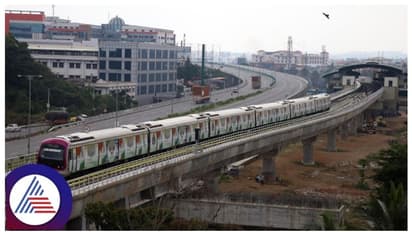Bengaluru metro tickets to rise after 7 years; Minimum fare to be Rs 15

Synopsis
Bengaluru Metro fares will rise after seven years, with the minimum fare increasing to Rs 15 and the maximum to Rs 75. The Fare Fixing Committee, formed under the central government, is reviewing the fare structure, with public feedback being accepted until October 28.
After a seven-year gap, the Bengaluru Metro fare is set for a revision. Starting soon, the minimum fare for a metro ride will increase to Rs 15, while the maximum fare will rise to Rs 75. The last fare revision took place in 2017, and now, for the second time, the Committee, formed by Bengaluru Metro Rail Corporation Limited (BMRCL), is reviewing the pricing structure. Public suggestions, instructions, and objections on the proposed fare revision are being accepted until October 28.
This fare revision is being managed by the first-ever Fare Fixing Committee formed by the central government under the Metro Railway (Operation and Maintenance) Act of 2002, Sections 33 and 34. Currently, the fares range from Rs 10 to Rs 60, and commuters who use smart cards and QR code tickets receive a 5% discount.
Good news for Bengaluru metro commuters! BMRCL to open Nagasandra-Madavara stretch on Green line today
BMRCL officials explained that various expenses, such as operation costs, maintenance, and staff salaries, have been increasing over the years. Despite these rising costs, there has been no fare increase in the last seven years. In response to concerns about the delay in the fare revision, BMRCL Managing Director Mahesh Rao M. clarified that the committee has not yet submitted its final report. He assured the public that a decision on the fare hike would be made after the committee’s review.
SWR becomes user-friendly by issuing UTS tickets
South Western Railway Bengaluru Zone has launched an innovative ticketing system aimed at making train travel more convenient for passengers. Under the unreserved Mobile Ticket System (M-UTS), railway staff will now be able to issue tickets directly to passengers, eliminating the need to wait in long queues at ticket counters. This system has already been implemented at KS Yeshavantpur and SMVT stations. The M-UTS service allows passengers to purchase tickets within 500 meters of the station, offering a quick and easy solution to buy tickets on the go.
Bengaluru metro fares likely to rise in December despite public pushback
This system will be expanded to other high-traffic stations in the future, according to railway officials. The handheld devices used by railway staff are designed to quickly issue tickets, providing a much more efficient alternative to traditional ticket counters. These mobile devices do not require fixed spaces or additional equipment, allowing ticket issuance to take place anywhere within the station.
The introduction of the M-UTS system is a step toward streamlining ticketing services, aiming to improve the overall passenger experience and reduce waiting times for commuters.
Stay updated with all the latest Business News, including market trends, Share Market News, stock updates, taxation, IPOs, banking, finance, real estate, savings, and investments. Track daily Gold Price changes, updates on DA Hike, and the latest developments on the 8th Pay Commission. Get in-depth analysis, expert opinions, and real-time updates to make informed financial decisions. Download the Asianet News Official App from the Android Play Store and iPhone App Store to stay ahead in business.